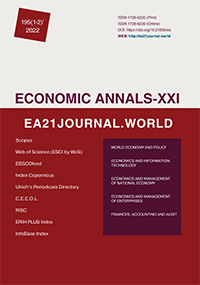The energy-saving projects’ impact on the level of an enterprise’s financial stability
The energy-saving projects’ impact on the level of an enterprise’s financial stability
Author(s): Fayez Al Sharari, Olexandr Yemelyanov, Yurii Dziurakh, Oleh Sokil, Olena DanylovychSubject(s): Business Economy / Management, Micro-Economics, Energy and Environmental Studies
Published by: Institute of Society Transformation
Keywords: Energy Saving Project; Debt Financing; Enterprise; Financial Stability; Investment Activity; Energy Saving;
Summary/Abstract: The article developed and tested tools for assessing the impact of debt financing of energy saving projects on the financial sustainability of those enterprises that implement these projects. In particular, an indicator for assessing the level of financial stability of business entities is proposed. The calculation of this indicator is based on a comparison of the forecast value of the flow of income of the enterprise, which it can use to fulfill its obligations to creditors, with the minimum allowable value of this flow, at which these obligations will be guaranteed to be fulfilled by the enterprise. A model for assessing the impact of debt financing of energy saving measures at enterprises on the level of their financial stability has been developed. Analytical expressions have been established for the limiting values of the part of the loan financing of energy-saving projects, under which the financial stability of the enterprise after the implementation of these projects will not decrease or will be at the minimum acceptable level. This made it possible to identify the conditions under which the introduction of investment measures at enterprises aimed at improving energy efficiency leads to an increase in the level of financial stability of business entities. These conditions provide for a limitation on the share of borrowed funds in the structure of sources of financing for energy saving projects, taking into account the forecast values of return on investment and other indicators that affect the ability of enterprises to fulfill their loan obligations in a timely manner. An empirical analysis was carried out on a sample of Ukrainian enterprises belonging to three types of economic activity. This analysis showed, in particular, that an increase in the investment activity of enterprises in the field of energy conservation has a positive impact on their level of financial stability. It was also found that the increase in the share of debt financing of energy-saving projects, to a certain extent, negatively affected the financial stability of the enterprises that implemented these projects. However, at any level of debt financing, the implementation of energy-saving projects made it possible to increase the average financial stability of the companies under study. The purpose of the article is to develop and use tools for assessing the impact of debt financing of energy saving projects on the financial sustainability of those enterprises that implement these projects.
Journal: Економічний часопис - ХХІ
- Issue Year: 195/2022
- Issue No: 1-2
- Page Range: 36-49
- Page Count: 13
- Language: English

